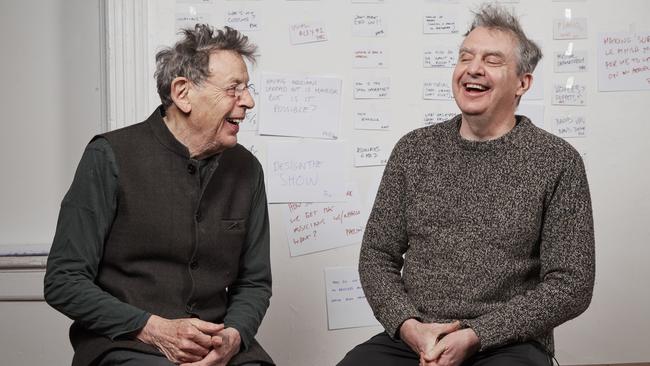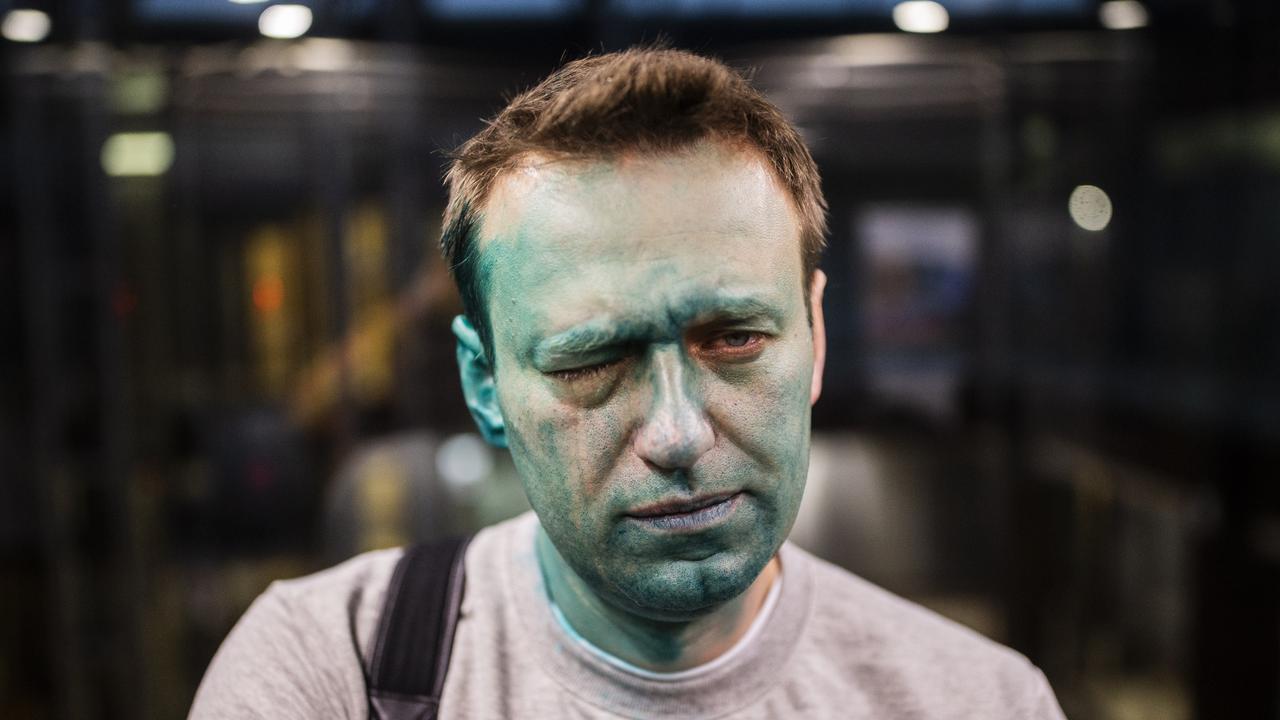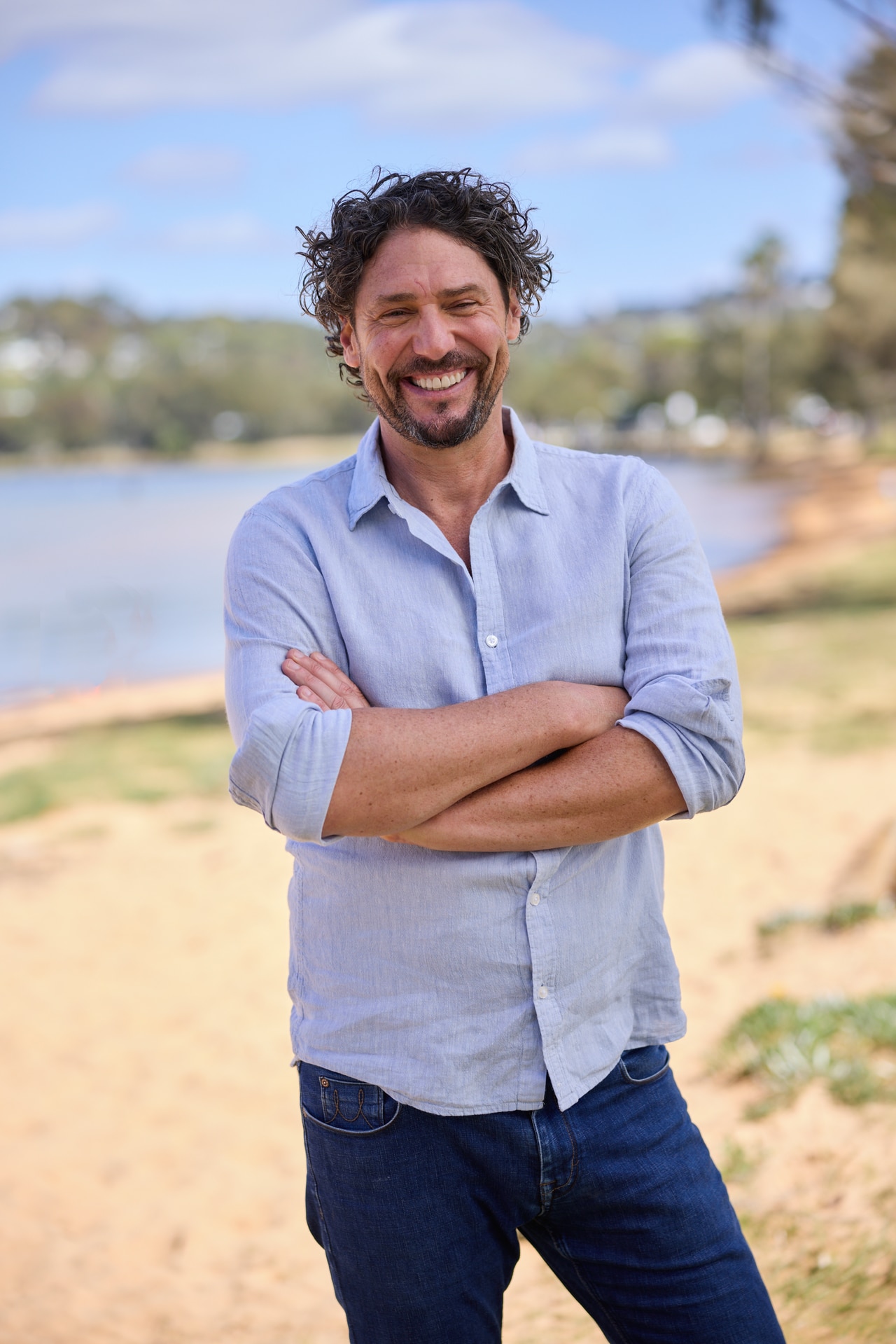The heart of Glass
A director’s unconventional tribute to collaborator and legendary composer Philip Glass is set to tour to the Perth Festival.

Over the past 14 years, British director Phelim McDermott has directed three operas composed by America’s master of minimalism, Philip Glass. In fact, McDermott’s Olivier Award-winning interpretation of Akhnaten, Glass’s opera about the pharaoh who introduced monotheism to ancient Egypt, has just wowed critics and audiences at New York’s Metropolitan Opera.
Featuring a young pharaoh who emerges naked from a mummy case and jugglers who perform in sync with Glass’s coolly elegant score, this internationally celebrated production started out at English National Opera and transferred to the Los Angeles Opera, before playing at the Met in November and December.
McDermott tells Review: “It was a kind of homecoming for Philip, to get that show on at the Met. It was their most successful show last year and they’ve immediately announced it’s coming back. So Philip’s gone from someone who people used to throw things at while he was playing his piano to someone who can fill the Metropolitan Opera for a whole run.’’
The director reckons that for any contemporary composer, such a feat “is totally unique’’, while his gag about patrons pelting Glass is a reference to how the composer’s deliberate musical repetitions drive some fans and critics to distraction.
In Satyagraha, Glass’s opera about Mahatma Gandhi’s political awakening — which McDermott co-directed for the Met — the title character repeats an ascending minor-key scale 30 times during the final scene.
Even so, the 2008 Met production McDermott oversaw with British colleague Julian Crouch, is considered a standout in the company’s history, with The Wall Street Journal describing it as “visual and musical magic’’ and the Los Angeles Times calling it “unbelievably moving’’.
Despite the long, productive working relationship between the Manchester-born showman and New York music legend, McDermott admits he was “really nervous’’ about asking Glass to work on a new, intensely personal show. “It felt like a dare to myself,’’ he says. Known as a fearless improviser through his work with Improbable, the British theatre company he co-founded, McDermott did not know much about the show he proposed to Glass.
At an initial meeting, when Glass, composer of the opera Einstein on the Beach, Oscar-nominated film scores and 12 symphonies, asked what this new show would be about, McDermott fessed up: “I don’t really know yet.’’
Nonetheless, the composer signed up for the mysterious project, which would eventually be titled Tao of Glass. A collage of new Glass compositions, storytelling fragments and puppetry, it is essentially McDermott’s tribute to the composer, one of our era’s most important music figures, and a show about making a show. It opens at the Perth Festival on February 19, before touring to Germany and the US. Speaking by phone from London, McDermott explains that Tao of Glass is “the story of my relationship to Philip’s music and my obsessions, from being a young student in the 80s, being obsessed by his music and first going to see his opera, Akhnaten, at the London Coliseum. And then tracing how I’ve used that music in my work, to the point where I ended up directing that opera I’d first seen as a student.’’
The winner of an OBIE (off-Broadway award) and a second Olivier gong, he recalls that as a college student, “I would go home and play the (Glass) records non-stop and drive my parents crazy. At that time I didn’t really know why I so much responded to this music that a lot of people don’t and, certainly at that time, didn’t respond to. Even now, some critics’ hair stands on end when they go to see a Philip Glass opera.’’
In Tao of Glass he performs a monologue, while puppets are carried overhead or created out of tissue paper, and an oversized piece of sheet music doubles as a screen for shadow puppetry. British critics have hailed the show as “astonishingly original” and “magical’’, but given Glass’s age — he is 82 — there were moments when a question mark seemed to hang over its development.
McDermott says, a little sheepishly, that at an early meeting, when he was regaling Glass with his ideas for the piece, “I noticed that he wasn’t … too awake as I was telling him’’. He returns fire on stage, joking: “I had bored him to sleep! This, the man who has put more audiences to sleep than anyone else!’’
He also recalls how later, “we had one week (of workshopping) in New York and I had all these stories I’d prepared. I’d heard that he had not been well and that he might not come in’’. On that occasion, not only did the composer turn up, within a week he had composed 10 short pieces of music for the show. “He’s not slowing down as he gets older, he’s speeding up. It’s astonishing really,’’ says McDermott.
Originally, the duo planned to collaborate on an adaptation of In The Night Kitchen, a children’s work by Maurice Sendak, author of Where the Wild Things Are. (Sendak is described as a “grumpy, gay Oscar the Grouch’’ in Tao of Glass.) McDermott met Sendak, and recalls him saying: “‘I really want you to make this show. You’ve gotta do it before I croak.’ (In 2012) he sadly did die. So that went away as a project; there was sadness it didn’t happen.’’
Tao of Glass premiered in McDermott’s home town for the Manchester International Festival last July. Glass attended the press night and astounded critics and patrons by walking onstage, minus any fanfare, and performing a piece of music that is a key part of the show.
One critic described the “electric’’ moment thus: “McDermott lay horizontal on the stage as his 17-year-old self, listening to a track from the album Glassworks, which morphed into Glass himself at the keyboard, running his fingers over those trademark repeated arpeggio patterns.’’
That was the composer’s sole appearance in the production. McDermott doubts Glass will fly to Perth to reprise his star turn but says he is “very present in the show’’, partly through a “magical theatrical solution that he came up with’’. During one rehearsal, McDermott told Glass about the therapist Arnold Mindell, who attempts to communicate with people in comas and near-death states. Glass responded: “Don’t talk about it, just do it!’’
While McDermott pretended to be in a coma, the composer played an original piece of music designed to “connect to these deeper states that people go into. It’s very beautiful.’’ The show aims to take audience members “into these deep states. So the climax of the show … is me on stage doing absolutely nothing. Just about the most untheatrical thing you could imagine.’’
Tao of Glass is also billed as a meditation on death, life and Taoist wisdom. McDermott says Taoism is largely about the gulf between our aspirations and what actually happens to us, and our capacity to deal with this. He applies this philosophy to Boris Johnson’s triumph in the recent British election and the rollercoaster ride that is Brexit.
“I would have liked a different outcome to our current election. But we have the result we now have … and we have to engage with that, as the world’s got a different plan for us.’’
His unusual first name, Phelim, is Irish and pronounced “fay-lim’’. “I usually just tell people to think about exams you fail in,’’ he jokes. “I was born in Manchester. My Irish ancestry is basically too far back to apply for a passport, in the current climate.’’ (He is referring to how hundreds of thousands of British citizens with Irish grandparents applied for European Union passports, ahead of Brexit taking effect.)
Improbable, the British company McDermott co-founded in 1996, started out doing small-scale improvised shows, moved to larger outdoor shows and — perhaps improbably — hit its straps staging big-budget operas.
McDermott has directed operas in London, Los Angeles, Madrid and New York — Akhnaten was the fifth production he has shepherded for The Met. Asked about the recently reignited debate on whether too many opera heroines are victims, he reflects that opera “has a canon of work that goes back centuries and it needs to reinvent itself. In how it addresses its stories and portrays sexual politics, opera definitely needs to be examined. It is a bit like slowly turning big ships, but that doesn’t mean change is not worthwhile.’’
While he was co-winner of a second Olivier Award in 2002 for Improbable’s staging of the dark children’s stories, Shockheaded Peter, his co-direction of another stage adaptation, the Broadway musical The Addams Family, was fraught. “Not one of the most enjoyable experiences of my life, doing a Broadway musical,’’ he admits. “It’s a very pressured environment.’’
The $US15m show opened in Chicago in 2009. It earned mixed reviews, and a “creative consultant’’, Tony-winning director Jerry Zaks, was added to the creative line-up just before it transferred to Broadway in 2010. (McDermott and his collaborator, Crouch, are still credited among the original directors and designers.)
Says McDermott: “It was tough at the time because you spend three years working on something, then you don’t get to see the end of the story. It sounds trite but you learn an incredible amount from those kind of difficult things. You learn that you have to create the work that you want to do and, in a way, Tao of Glass would not have happened if that hadn’t happened.’’
Aged 56, he lives in London and often shuttles between Britain and the US for work: “The most challenging thing for me about touring is that I have a family now. I’ve got two children — one’s eight and one’s three — and being away from home, and with them being at school, that’s more of a challenge than it was.’’
While he started out as an actor and theatre director, he has ended up working in opera’s highest echelons. He says throughout his career, “that threshold where you’re trying to push the boundaries of what’s possible a little bit has always been there. It’s not easy to do that in opera.’’
On the other hand, “opera’s much more open to more radical ideas, in some ways, than something like Broadway. When you make an opera, they’re not going to go, ‘Is it going to be a commercial success?’. They want it to work as art.’’
The Perth Festival show is not the first time McDermott has brought Glass’s music to Australia. He directed his opera, The Perfect American, about the last days of Walt Disney, for the 2014 Brisbane Festival, using animated projections and an animatronic model of Abraham Lincoln.
He also co-directed several Improbable hit shows that have toured here: Life Game, in which cast members interview guests and improvise scenes from their lives, was also shown at the Brisbane Festival, while Beauty and the Beast toured to the 2015 Adelaide Festival and portrayed an X-rated love story between a disabled man and a burlesque queen. Outdoor show Sticky — featuring a multistorey spider web made from 3000 rolls of sticky tape — drew punters to the 2003 Sydney Festival.
“I’ve had a good time every time I’ve been to Australia, so I’m really looking forward to the Perth Festival,’’ says McDermott.
For many fans, Glass’s music is profound and meditative; as powerfully hypnotic as it is ritualistic. For others, it’s a turn-off and an acquired taste. Why is McDermott so drawn to it? “It seems to me to relate to patterns and principles in nature that are really beautiful,’’ he replies.
“If you see images of patterns of people in a city speeded up, and you put that with Philip’s music, a very clear relationship to what’s going on in life (emerges). The music asks you to look at the world, and look at nature and look at life in a certain way.’’
Tao of Glass by Philip Glass and Phelim McDermott plays at the Perth Festival from February 19 to 23.


